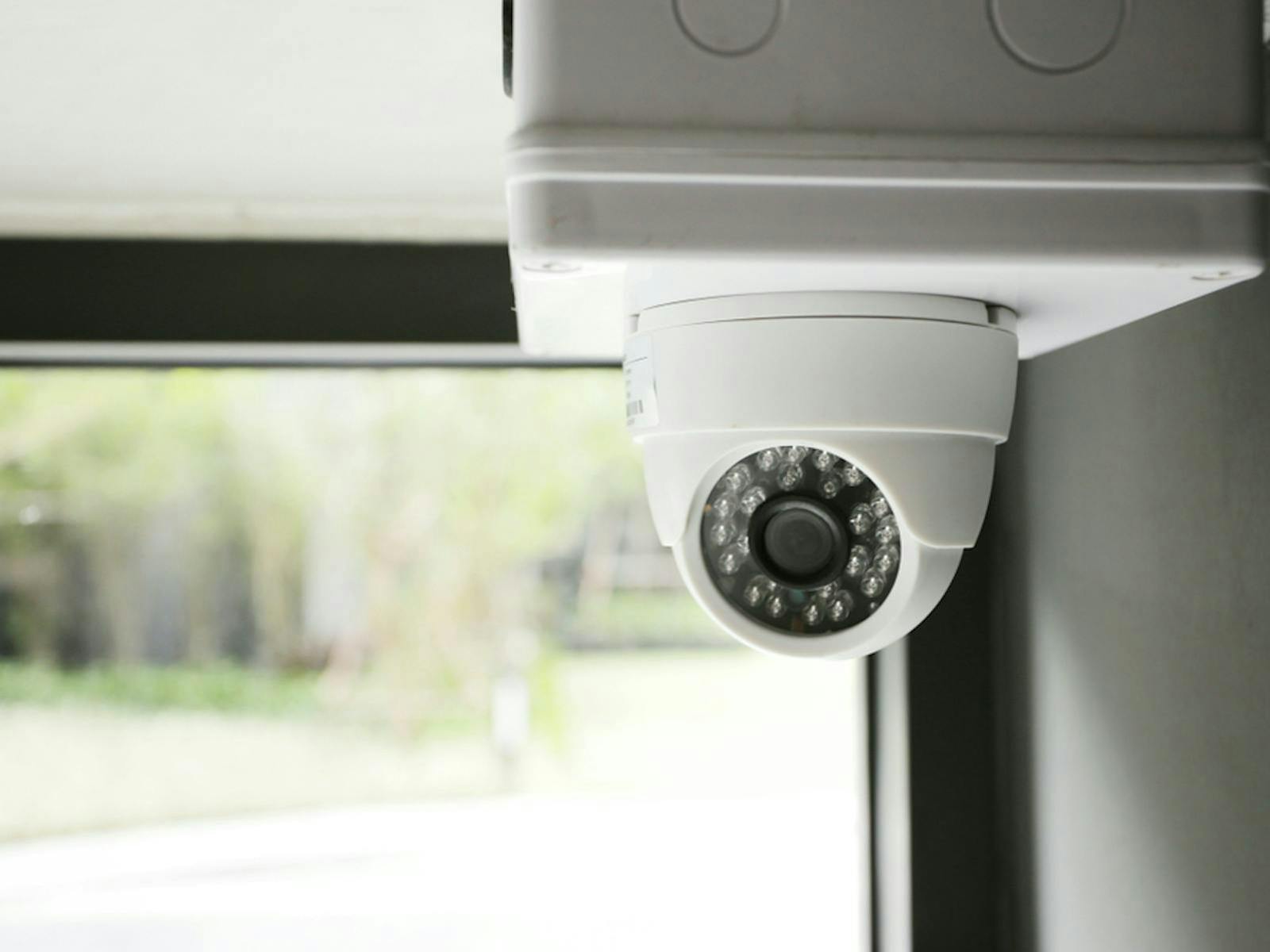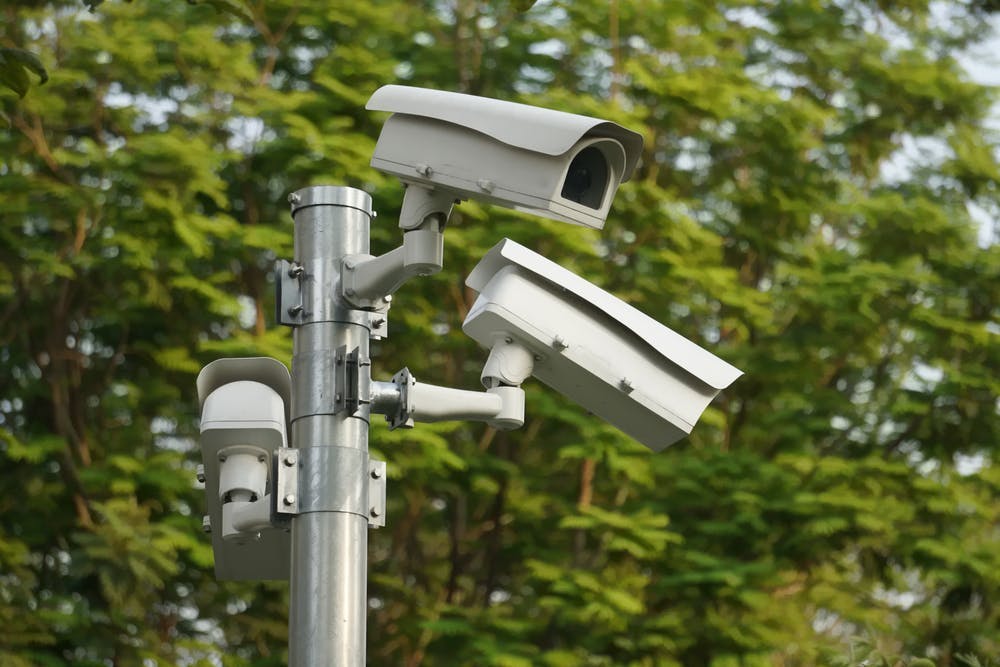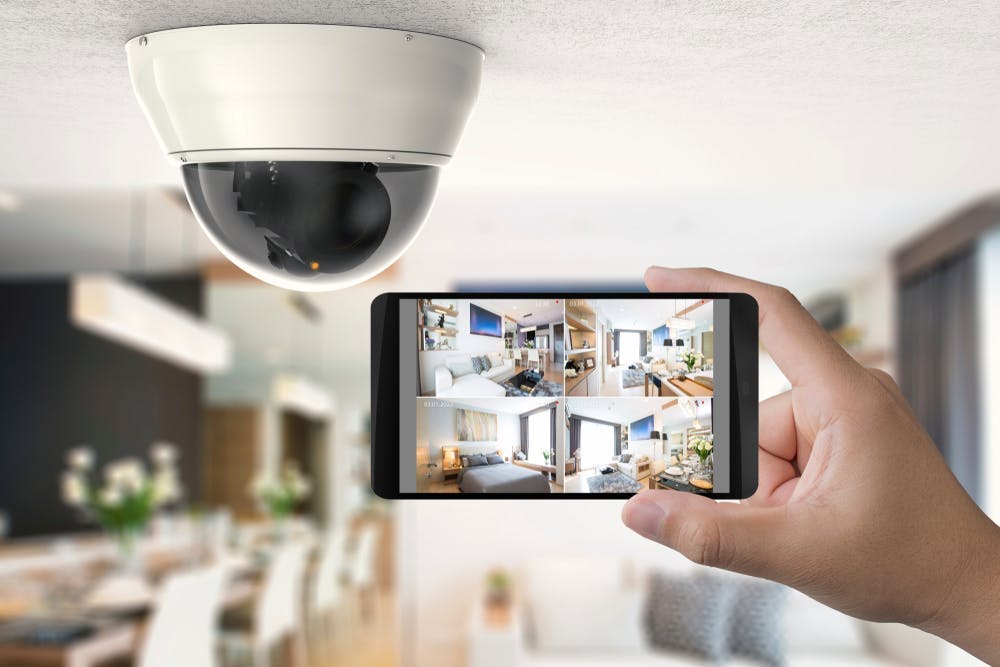
Location
Where you station your CCTV cameras will vary in line with the shape, size and type of property you want to protect, as well as your budget.
Indoor CCTV
Especially useful for small businesses, as well as residents of flats or apartments without outdoor space, indoor CCTV cameras can be a great way to secure a property. We recommend avoiding any places which are more private, and instead focusing on vulnerable areas near entry points, like the hallway.
Outdoor CCTV
Outdoor CCTV cameras are a more popular choice for those on the hunt for a home security system, and these tend to be more expensive than the indoor alternative. This is because outdoor CCTV cameras have to be weather-proof and able to withstand rain, wind, as well as a range of naturally occurring temperatures. Outdoor CCTV cameras often come in a dome or bullet shape, with protective casings to keep them safe from the elements.
Video doorbells
Another great option for residential properties, video doorbells (or doorbell cameras) sit specifically outside the front door. This camera enables you to see exactly who’s at your door before you go to answer it, as well as keeping tabs on anyone who enters and leaves your property throughout the day. Plus, some video doorbells give you the option to check notifications and footage from your smartphone.
Power source
CCTV can be powered by a mains connection, or via long-life batteries – but there are pros and cons to both of these choices.
Wired CCTV cameras
Simply put, wired CCTV cameras don’t rely on battery power to operate – but are hooked up to the mains supply instead. That means they never run out of power, so you don’t need to worry about waning battery life. That said, they won’t continue to work during a power cut, and hooking CCTV cameras up can be a challenge depending on the layout of the property, particularly if they’re for outdoor use.
Wireless CCTV cameras
Contrastingly, wireless CCTV cameras are powered by batteries, so there are no restrictions on where they can be placed around the building. It’s worth noting that the battery life of wireless cameras will depend almost entirely on your usage – and they could last several months or even years when used efficiently. One particular advantage of wireless CCTV is that it will keep working when you encounter problems with your internet connection, so nothing compromises the footage.
Connectivity
Another key distinction between the different types of CCTV is whether they’re connected to a Wi-Fi network, or record and store footage independently.
Wi-Fi CCTV
In 2022, the majority of properties which use CCTV are connected to a Wi-Fi network. With modern systems like this, footage is stored in an online database like the cloud, and the cameras themselves can be usually accessed remotely via a corresponding app on a compatible device. There’s a whole host of benefits to choosing CCTV with a Wi-Fi connection – not least that you can see live footage of your home from your smartphone, wherever you are in the world.
Analogue CCTV
While it’s rare for both households and businesses to operate without Wi-Fi, it’s still possible to run a CCTV system without. Analogue CCTV cameras record and store footage onto a physical SD card, and you’d need a material copy of this to view the film. The footage from analogue cameras also tends to be of poorer quality, but there’s some evidence that they perform better in low light than Wi-Fi CCTV cameras.

Where to position a security camera
While any security camera will act as a deterrent, if a criminal is determined enough they won’t think twice about removing them or damaging them. That’s why we’d recommend positioning them high up in an inaccessible location. If you need a ladder and tools to put them up, they’ll need the same to take them down, and it’ll be much harder to achieve without arousing suspicion.
Be sure to avoid any areas that might make it easier for a potential burglar to scale the property or cross a boundary, such as near fences, porticos any low roofs.

Aside from cameras directly outside your property, we recommend installing cameras in areas that contain valuable items, such as driveways, garages and sheds.
Important factors to consider
As well as location and position of your CCTV cameras, there are other features to look out for when choosing the best products for you.
Resolution
Before you choose a security camera, it’s important to understand its resolution. If the only footage you capture is pixelated and impossible to decipher, you may as well have no security cameras at all.
There’s a great range of resolution options available, from black and white, simple footage that records every few seconds, through to HD cameras that will capture every detail.
Higher value items could make it worth spending a little more on the high-def options, while entrance ways might only need still shots of people coming and going.
Night Vision
Once you’ve got your resolution in the light sorted, it’s time to think about when it gets dark. Smart CCTV and surveillance systems will switch to night mode automatically when the sun goes down, giving you a clear picture of anything that happens during the night.
Cameras that offer night vision are particularly useful for businesses that are left completely unoccupied overnight.
Storage
The amount of storage a security camera comes with is important, with the amount of storage you require very much depends on that amount of footage you need, and how long you need to save it for.
Most modern security cameras offer footage compression, meaning that they only take up half the hard drive space of their older alternatives. On top of that, some security camera kits include DVR storage, making it simple to set up without the need to pay for any additional components to create an effective and efficient system.
A camera with 1TB of storage could hold up to 500 hours of HD footage, which would be more than enough for most commercial properties. The amount of storage you will need depends on the resolution you choose to go for, if you’re opting for lower resolution, you’ll more than likely need less storage, and vice versa.
Smartphone Apps
Security cameras are getting more and more advanced. From Door Entry Systems that can be unlocked with a fingerprint, through to CCTV you control with your phone, smart security is here to stay.
CCTV systems that can be controlled via smartphone apps offer an elevated level of control, giving you the ability to view your property on the go, and even sometimes communicate with anyone that the camera picks up on.
CCTV systems are a vital part of any domestic or commercial security system, and choosing the right system for your specific needs is just as important. We offer a vast range of CCTV Surveillance Systems, with unique features to fit your specific requirements, and for an extra boost of security, browse our range of Alarm Security Systems too.
